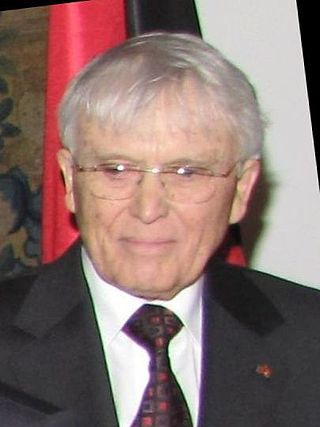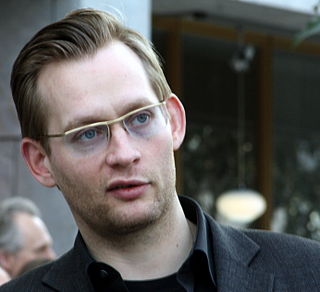
Judith Hermann is a German author. She has published several books of short stories and her first novel was published in 2014. She is a leading figure of the Fräuleinwunder group of women writers.

Paul Nizon is a Swiss art historian and writer.

Daniel Kehlmann is a German-language novelist and playwright of both Austrian and German nationality.

Ingo Schulze is a German writer born in Dresden in former East Germany. He studied classical philology at the University of Jena for five years, and, until German reunification, was an assistant director at the State Theatre in Altenburg 45 km south of Leipzig for two years. After sleeping through the events of the night of 9 November 1989, Schulze started a newspaper with friends. He was encouraged to write. Schulze spent six months in St Petersburg which became the basis for his debut collection of short stories 33 Moments of Happiness (1995).

Eva Menasse is an Austrian author and journalist. She has studied history and German literature. Menasse had a successful career as a journalist, writing for the Frankfurter Allgemeine Zeitung in Frankfurt and as a correspondent from Prague and Berlin. She left the paper to write her first novel, Vienna, and now lives and works in Berlin as a freelance author.

Marcel Beyer is a German writer.

Peter Stamm is a Swiss writer. His prize-winning books have been translated into more than thirty languages. For his entire body of work and his accomplishments in fiction, he was short-listed for the International Booker Prize in 2013, and in 2014 he won the prestigious Friedrich Hölderlin Prize.

Reiner Kunze is a German writer and GDR dissident. He studied media and journalism at the University of Leipzig. In 1968, he left the GDR state party SED following the communist Warsaw Pact countries invasion of Czechoslovakia in response to the Prague Spring. He had to publish his work under various pseudonyms. In 1976, his most famous book The Lovely Years, which contained critical insights into the life, and the policies behind the Iron Curtain, was published in West Germany to great acclaim. In 1977, the GDR regime expatriated him, and he moved to West Germany (FRG). He now lives near Passau in Bavaria.

Ralf Rothmann is a German novelist, poet, and dramatist. His novels have been translated into several languages, with Knife Edge, Young Light, Fire Doesn't Burn, To Die in Spring and The God of that Summer being translated into English. The main subjects of his work are the bourgeois and proletarian realities of life in the Ruhr area as well as Berlin, with an autobiographically colored focus on alienation, the attempt to escape these situations, and common solitude. With the major novels Im Frühling sterben, Der Gott jenes Sommers and Die Nacht unterm Schnee, Rothmann goes back to the time of the Second World War and explores the horrors for the individual. The four volumes of short stories Ein Winter unter Hirschen, Rehe am Meer, Shakespeares Hühner and Hotel der Schlaflosen complete the author's extensive oeuvre.
The German Book Prize is awarded annually, in October, by the German Publishers and Booksellers Association to the best new German language novel of the year. The books, published in Germany, Austria and Switzerland, are nominated by their publishers, who can propose up to two books from their current or planned publication list. The books should be in shops before the short-list is announced in September of the award year. The winner is awarded €25,000, while the five shortlisted authors receive €2,500 each. It is presented annually during the Frankfurt Book Fair.

Ursula Krechel is a German writer.

Terézia Mora is a German Hungarian writer, screenwriter and translator.

Clemens Meyer is a German writer. He is the author of Als wir träumten, Die Nacht, die Lichter, Gewalten, Im Stein, and Die stillen Trabanten. Of Meyer's works, All the Lights,Bricks and Mortar, “As We Were Dreaming,” and Dark Satellites have been translated into English.
Rheingau Literatur Preis is a literary prize of Hesse. It is awarded annually since 1994 by the Rheingau Literatur Festival which follows the Rheingau Musik Festival. An author is awarded whose prose gained the attention of the literary critics
Friedrich-Hölderlin-Preis is a German literary prize. It was established in 1983. The City of Bad Homburg vor der Höhe awards the prize annually in June. It is endowed with 20,000 euros and is awarded as a general literary award for outstanding achievements. The award commemorates the poet Friedrich Hölderlin who lived in Bad Homburg for a few years. It is awarded at the anniversary of the evening before Friedrich Hölderlin's death.

Reinhard Jirgl is a German writer.

Ulrike Draesner is a German author. She was awarded the 2016 Nicolas Born Prize.

Monique Schwitter is a Swiss writer and actress.
The Uwe Johnson Prize is an annual German literary award. The award is named after the writer Uwe Johnson (1934–1984) and was first awarded in 1994. It is awarded for "outstanding literary works in which there are links to the poetics of Uwe Johnson". Alternating the main prize for a work and the Förderpreis for the best debut is awarded by the Mecklenburg Literature Society, the Nordkurier (1994–2016), the Berlin law firm Gentz und Partner and the Humanistischer Verband Deutschlands. The prize is endowed with €20,000.















